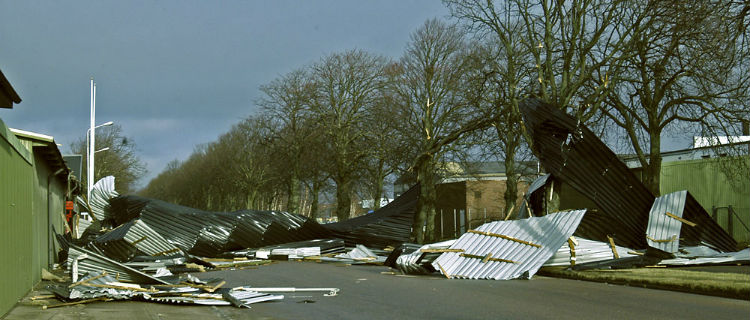
Living with extremes
Centre researchers contribute to UN reports on extreme weather and emergent environmental issues
Scientists are increasingly confident that the increased number of extreme weather events, like heat waves and heavy rainfall, is linked to human-induced climate change.
This is also the conclusion of a new report from the UN Intergovernmental Panel on Climate Change (IPCC) entitled Special Report on Managing the Risks of Extreme Events and Disasters to Advance Climate Change Adaptation (SREX).
Jointly coordinated by Working Groups I (WGI) and II (WGII) of the IPCC, the report focuses on the relationship between climate change and extreme weather and the strategies to manage the associated risks.
Groundbreaking for resilience thinking
Interestingly, chapter 8 of the report is entitled "Toward a Sustainable and Resilient Future" and features centre researchers Carl Folke and Reinette (Oonsie) Biggs along with senior research fellow Claudia Pahl-Wostl.
"This is really groundbreaking for resilience thinking and I am delighted we can contribute to the IPCC process," says science director Carl Folke.
Folke and his colleague argue that by reducing human pressures on ecosystems and managing natural resources more sustainably, efforts to mitigate climate change and to reduce vulnerabilities to extreme climate and weather events is possible.
Not just climate change
The authors also discuss how biodiversity can be important to adaptation, pointing to the fact that functionally diverse systems tend to adapt better to climate change and climate variability than functionally impoverished systems.
Furthermore, resilience thinking is a good framework for understanding integrated human-environmental (social-ecological) systems and how they respond to not only climate change, but also a range of different perturbations.
"Resilience thinking is already applied in both developed and developing country contexts as a guiding principle to disaster risk reduction and adaptation issues, as well as to examine specific responses to climate change," Carl Folke explains.
Four key contributions
Considering the new report's focus on extreme weather events, chapter 8 concludes that resilience approaches offer at least four key contributions for living with extremes: first, it provides a holistic framework to evaluate hazards in coupled social-ecological systems; second, it puts emphasis on the capacities to deal with hazard or disturbance; third, it helps to explore options for dealing with uncertainty and future changes; and fourth, it can help identify enabling factors to create proactive responses.
Contribution to a second UN report
Carl Folke also contributed to another recent UN report, the UNEP Foresight Report 21 issues for the 21st century. Together with globally renowned water expert Malin Falkenmark, Folke was part of the report's Foresight Panel. The purpose was to highlight and rank the most important emerging issues related to the global environment.
Resilience is highlighted several times in the report, particularly when discussing future food security, ecologically sustainable fisheries and urban sustainability.
The Foresight Process has already had a big influence on UNEP activities and the issues identified in the Foresight Process have been included in the official UNEP submission to the Rio+20 process.
About the centre authors
Professor Carl Folke is Science Director of the centre and has extensive experience in transdisciplinary collaboration between natural and social scientists. He has worked with ecosystem dynamics and services as well as the social and economic dimension of ecosystem management and proactive measures to manage resilience.
Oonsie Biggs' research focuses on regime shifts — large, abrupt, long-lasting changes in the dynamics of coupled social-ecological systems that can have dramatic impacts on human economies and societies.
Read more about Senior Research Fellow Claudia Pahl-Wostl here.






